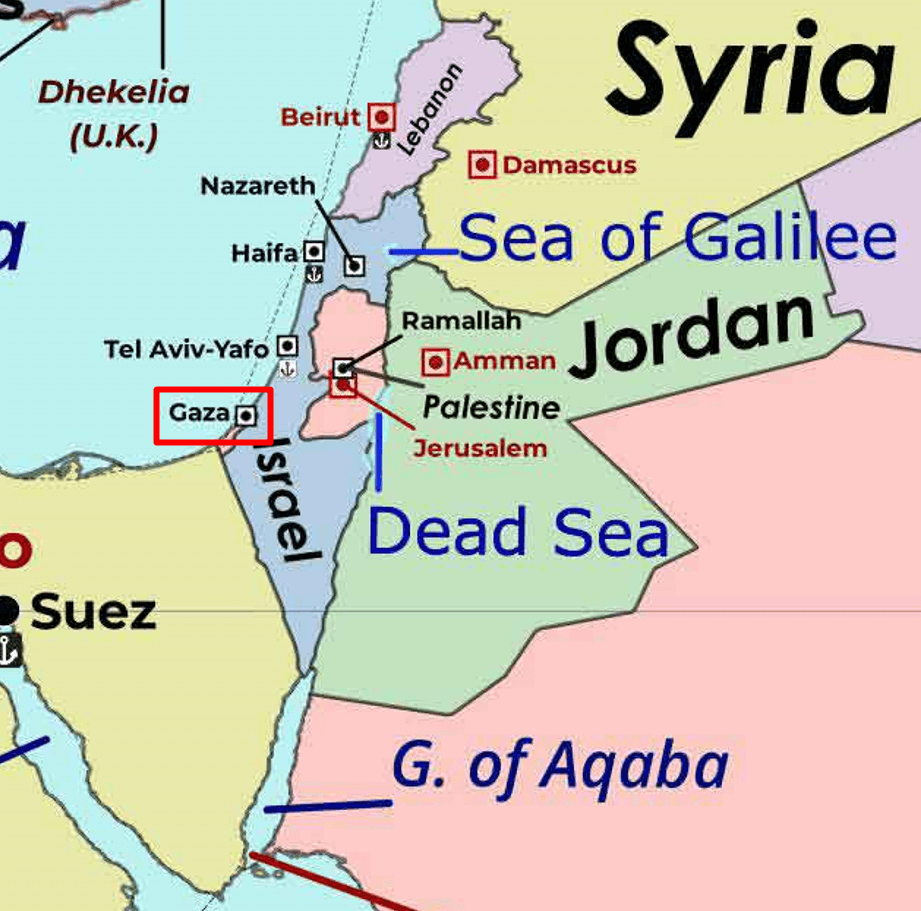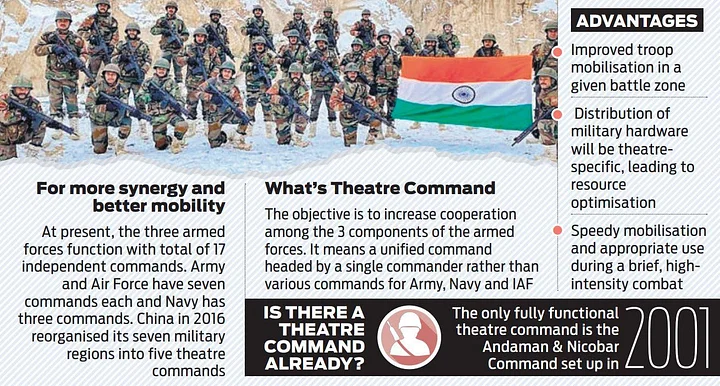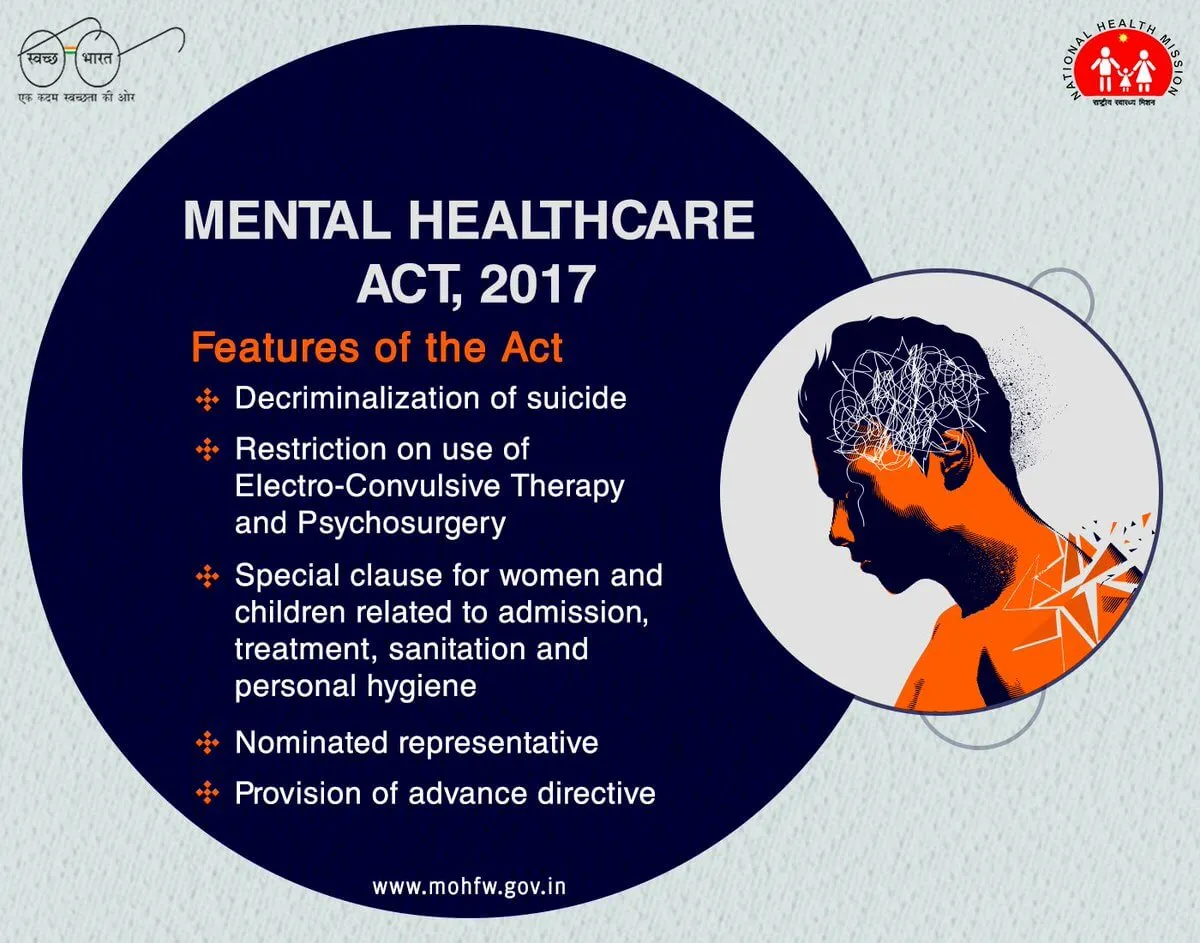
Current Affairs July 09-10, 2023: Uniform Civil Code (UCC), Nari Adalat (Women’s Court), Anti-Defection Law, Armed Forces Special Powers Act
Subscribers of "Current Affairs" course can Download Daily Current Affairs in PDF/DOC
Subscribe to Never Miss an Important Update! Assured Discounts on New Products!
Must Join PMF IAS Telegram Channel & PMF IAS History Telegram Channel
{GS2 – IR – International Institutions – 2023/07/10} World Trade Organization (WTO)
- Context (TH I IMF): The two-tiered dispute settlement system of the WTO is in a state of paralysis.
- WTO is an intergovernmental organisation that regulates and facilitates international trade between nations, operating in a member-driven and consensus-based manner.
- With its headquarters in Geneva, Switzerland, it is the world’s largest international economic organisation. It boasts 164 member states, representing over 98% of global trade and GDP.
- Formally established on January 1, 1995, under the 1994 Marrakesh Agreement, the WTO replaced the General Agreement on Tariffs and Trade (GATT) of 1948 after the culmination of the Uruguay Round, an eight-year-long negotiation process.

The mandate of the WTO
- The WTO’s mandate encompasses the facilitation of trade in goods, services, & intellectual property.
- It achieves this by providing a framework for negotiating trade agreements that aim to reduce or eliminate tariffs, quotas, and other trade restrictions.
- Additionally, the WTO oversees independent dispute resolution mechanisms to ensure compliance with trade agreements and resolve trade-related disputes.
- While the WTO prohibits discriminatory practices among trading partners, it allows for exceptions in cases related to environmental protection, national security, and other significant objectives.
The Organisational Structure of the WTO

- The Dispute Settlement Body (DSB) is a platform for addressing disputes between WTO members.
- The DSB possesses the authority to establish dispute settlement panels and make decisions based on their recommendations.
- DSB may also consider reports from the Appellate Body, which hears appeals from panel reports.
- Currently, the appellate body, which constitutes the second tier of the WTO’s Dispute Settlement System (DSS), remains non-functional.
Reasons for the appellate body’s non-functionality
- From 1995 to 2019, the appellate body upheld the international rule of law by holding powerful countries, such as the US and the EU, accountable for breaching international laws.
- However, its once-supportive entity, the US, has now become its most prominent critic, obstructing the appointment of its members.
The US argument
- The US argues that the appellate body must consistently interpret and apply WTO agreements without establishing binding precedents.
- According to the US, creating binding precedents through appellate body decisions represents judicial overreach and exceeds its institutional mandate.
The way forward
- Other countries can elect appellate body members through voting at the WTO’s General Council meeting, ensuring a path toward a functional dispute resolution mechanism.
The US’s larger game plan: De-judicialization of trade multilateralism
- In a neoliberal economic system, the ‘invisible hand’ of market competition should be complemented by the ‘visible hand’ of the law.
- WTO, rather than national actors, has become the ‘visible hand‘ of the law in regulating global trade.
- This has led to a loss of control for nations over critical decision-making, eroding their sovereignty.
- De-judicialization is the reverse phenomenon, where countries seek to weaken international courts/regulators to regain decision-making power.
- Amid the emerging geo-economic challenges posed by a rising China, the US aims to exercise complete control over its trade policies by De-judicialization of WTO.
{GS2 – IR – Treaties – 2023/07/10} Convention on Cluster Munitions
- Context (BBC I TH): The US wants to comply with a Ukrainian request to supply cluster munitions.
- Cluster munitions are a method of dispersing large numbers of tiny bomblets from a rocket, missile, or artillery shell that scatters them in mid-flight over a wide area.
- They are intended to explode on impact, but a significant proportion are “duds”, meaning they don’t explode initially – this happens especially if they land on wet or soft ground.

Convention on Cluster Munitions (Why are they banned?)
- More than 100 countries, including the UK, France, and Germany, have signed an international treaty – the Convention on Cluster Munitions – that outlaws the use or stockpiling of these weapons due to their indiscriminate effect on civilian populations.
- Children are particularly prone to injury as the bomblets can resemble a small toy left in a residential or farmland area and are often picked up out of curiosity.
- Human rights groups have described cluster munitions as “abhorrent” and even a war crime.
Who still uses them?
- Both Russia and Ukraine have been using cluster munitions since the start of Russia’s full-scale invasion in February 2022. Neither has signed the treaty banning them.
- The US also has not signed the treaty but has criticised Russia’s extensive use of the weapon.
- Russian cluster munitions reportedly have a “dud rate” of 40%, meaning large numbers remain a hazard on the ground, whereas the average dud rate is believed to be close to 20%.
{GS2 – MoWCD – 2023/07/10} Women Empowerment: Nari Adalat (Women’s Court)
- Context (TH): Nari Adalat will be set up at the village level as an alternative dispute resolution.
- These Adalats will be exclusively dedicated to women and girls.
- They will be a platform for women to voice their problems and fight for their rights.
- The Ministry of Women and Child Development would run the scheme under the Sambal sub-scheme of Mission Shakti.
Functions
- It will be set up at the village level as an alternative dispute resolution forum for domestic violence and property rights and to counter the patriarchal system.
- The court will address individual cases and raise awareness of government schemes and women’s legal rights and entitlements.
- It will not hold any legal status. It will function as a pressure group.
Composition
- Each Nari Adalat village will have seven to nine members:
- Half of which would be the elected members of the gram panchayat
- Other half will include teachers, doctors and social workers – who would be nominated by the villagers.
Need for Nari Adalats
- The traditional forms of justice-dispensing mechanisms have patriarchal biases.
- If women ever dared to raise their voices against the atrocities inflicted on them, they would face criticism and humiliation (victim-shaming).
- Personal accounts of the victims who sought justice through Nari Adalat will encourage others to voice their problems and fight for their rights.
Welfare of Women and Children
Saksham Anganwadi & Poshan 2.0
Mission Shakti
Sambal sub-scheme
Samarthya sub-scheme
Mission Vatsalya
|
{GS2 – Polity – Bodies – Statutory – 2023/07/10} SFIO
- Context (BT): Ministry of Corporate Affairs will explore the possibility of involving the Serious Fraud Investigation Office (SFIO) to investigate the irregularities at Think and Learn Pvt. Ltd (Byju’s).
- Under Section 143 of the Companies Act, a statutory auditor quitting an audit assignment must report to the government any fraud in the company.
Serious Fraud Investigation Office (SFIO)
- SFIO is a multi-disciplinary organisation under the Ministry of Corporate Affairs, consisting of experts in the field of accountancy, forensic auditing, law, information technology, investigation, company law, capital market, and taxation for detecting and prosecuting or recommending for the prosecution of white-collar crimes/frauds.
- Section 211 of the Companies Act, 2013, has accorded statutory status to SFIO.
- SFIO also has powers to arrest people for violating Company law.
{GS2 – Polity – IC – DPSP – 2023/07/10} Uniform Civil Code (UCC)
- Context (TH): UCC panel to hear views of Law Ministry.
- The UCC is the idea of having a common set of personal laws on marriage, divorce, inheritance, adoption, and succession that would apply to all citizens irrespective of religious affiliations.
- Underlining principle of UCC is that the laws should be gender-neutral, religion-neutral, and uniform grounds procedure for all citizens in civil matters such as marriage, divorce, etc.
Constitutional provisions
Seems to align with the idea of UCC
- Article 44 in part IV (Directive Principles of State Policy) of IC says that the state “shall endeavour to secure for the citizens a uniform civil code throughout the territory of India”.
- Part IV of IC deals with the Directive Principles of State Policy, which are not enforceable or justiciable in a court of law but are fundamental to the country’s governance.
Seems to be in contravention of the idea of UCC
- Sixth Schedule [Articles 244(2) and 275(1)] was created to conserve and protect the customary laws and practices of different communities.
- Provisions of the Sixth Schedule apply to the Administration of Tribal Areas in the States of Assam, Meghalaya, Tripura, and Mizoram.
- Article 25: lays down an individual’s fundamental right to religion.
- Article 26(b): upholds the right of each religious denomination or any section thereof to “manage its own affairs in matters of religion.
- Article 29: defines the right to conserve distinctive culture.
Arguments against UCC
- The Constituent Assembly refrained from implementing a UCC due to existing mistrust between communities. Implementing a UCC in present-day India would only exacerbate the divides.
- Certain civil laws in all communities are inseparably connected with religious beliefs and practices.
- The UCC would come in the way of Article 25-28 of IC, which guarantees the right to freedom of religion subject to public order, morality, and health.
- All Hindus are not governed by a homogenous personal law even after the enactment of the Hindu Code Bill, and so are Muslims and Christians under their personal laws.
- For instance, in the Northeast, there are more than 200 tribes with various customary laws. The Constitution itself protects local customs in Nagaland.
UCC and Tribal rights
- Provisions of the Hindu Marriage Act, 1955 and the Hindu Succession Act, 1956, do not apply to any Scheduled Tribe unless the Central Government explicitly directs the same.
- Many tribal groups fear that the UCC may dilute tribal customary laws and rights.
Plurality is a common feature across domains
- India does have uniformity in most criminal and civil matters. However, states have made over 100 amendments to the CrPC and IPC and several amendments to civil laws.
- If plurality exists in already codified civil and criminal laws, how can the concept of ‘one nation, one law’ be applied to diverse personal laws of various communities?
Arguments for UCC
- UCC would promote gender equality.
- If personal laws of inheritance, succession and so on are seen as a part of religion, then many discriminatory practices of the Hindu personal law against women could not be eliminated.
- UCC would not be against the freedom of religion as IC allowed the government to make laws covering secular activities related to religious practices if they were intended for social reform.
Supreme Court called for implementing the UCC
- In many cases, while deciding whether to give prevalence to the CrPc or the Muslim personal law, the SC called for implementing the UCC.
- SC in 2019 hailed Goa as a “shining example” of an Indian State with a functioning UCC.
-
Central government’s view
- The Central government holds that the overarching aim of the UCC is to ensure gender justice.
- The Central government told SC that IC obligated the State to have a UCC and said that people of different religions following different property/matrimonial laws was an “affront to the nation’s unity”.
Constituent assembly’s view
- The framers of IC did not intend total uniformity or one law for the whole country, which is why personal laws were placed in entry 5 of the Concurrent List (hence they differ from state to state), with the power to legislate given to Parliament and State Assemblies.
Report of 21st Law Commission on UCC
- In 2018, the Law Commission issued a consultation paper instead of a final report on the UCC.
- The paper titled Reforms of Family Law argued for reforming family laws across religions through amendments and codifying personal laws to limit “ambiguity in interpretation” and application.
- Followings are some of the suggestions:
- UCC is neither necessary nor desirable at this stage.
- A unified nation did not necessarily need “uniformity”. Difference did not always imply discrimination in a robust democracy.
- Secularism could not contradict the plurality prevalent in the country. “Secularism” had meaning only if it assured the expression of any form of difference.
- Cultural diversity cannot be compromised to the extent that our urge for uniformity itself becomes a reason for threat to the territorial integrity of the nation
- Discriminatory practices within a religion should not hide behind the cloak of that faith to gain legitimacy. The discriminatory practices, prejudices and stereotypes within a particular religion and its personal laws should be studied and amended.
- Women must be guaranteed their freedom of faith without compromising their right to equality, as it would be unfair to make women choose between one or the other.
- Certain measures in marriage and divorce should be uniformly accepted in the personal laws of all religions. Some of these amendments include fixing the marriageable age for boys and girls at 18, making adultery a ground for divorce for both men and women, etc.
{GS2 – Polity – IC – Legislature – 2023/07/04} Anti-Defection Law
- Context (TH): NCP has moved a disqualification petition to the speaker against nine MLAs.
- Context (TH): Maharashtra Speaker issues disqualification notice to 40 MLAs of the Eknath Shinde camp and 14 MLAs of the Uddhav Thackeray faction.
- In 1985, the Tenth Schedule and Article 102(2) of the IC were added by the 52nd Constitutional Amendment Act, which provides for the disqualification of MLAs.
- The objective is to strengthen parliamentary democracy by curbing unprincipled political defections.
Grounds for Disqualification
- The Tentch Schedule (Anti-Defection Law) provides two grounds for disqualification:
- If the member voluntarily gives up their membership of a political party.
- If a member abstains from voting or votes against their party’s directions without the party’s consent.
- The law is also applicable to independent MLAs. They are prohibited from joining a political party; if they do so, they can lose their membership in the legislature.
Exceptions
- The anti-defection law does not apply if two-thirds of the party’s MLAs leave a political party. But, these MLAs have to merge with another party to avoid disqualification.
Adjudicating Authority
- Speaker is the deciding authority. Article 180(1) of the Constitution states that the Deputy Speaker performs the Speaker’s duties when the office is vacant.
- In Ravi Naik vs Union of India (1994), SC held that the Speaker could decide that a member had voluntarily given up their membership based on their conduct, even without a formal resignation.
- In Rajendra Singh Rana Vs Swami Prasad Maurya Case, 2007, SC held that the disqualification would be said to have occurred the moment the members commit the act of defection.
- SC held that the Speaker can not initiate disqualification proceedings suo moto and would have to be approached with a petition first.
- An MLA has the right to participate in the proceedings of the House regardless of the pendency of any petitions for their disqualification.
Time limit
- There is no time limit to decide the matter under the anti-defection law.
- Speakers decide the matter after hearing all parties, which could take time.
- SC has recommended that Speakers decide on defection cases in three months.
Judicial Clarification
Kihoto Hollohan Case, 1991
- SC upheld the constitutionality of the Tenth Schedule.
- It affirmed the Speaker’s power to decide questions of disqualification.
- It concluded that the Speaker’s decision is subject to judicial review.
Nabam Rebia Case, 2016
- The case was heard to decide whether a Speaker facing resolution for the removal can adjudicate disqualification petitions under the Tenth Schedule of the Constitution.
- SC concluded that a presiding officer should not adjudicate any disqualification complaint while a motion of his own removal is pending.
Karnataka Assembly Case, 2019
- SC stated that disqualification proceedings would not be affected by the member submitting their resignation after the act of disqualification had been committed.
- SC held that the Speaker did not possess the power to specify a period of time for the disqualification, nor did they have the power to bar a member from contesting in elections.
Maharashtra case, 2023
- SC cannot adjudicate petitions for disqualification under the Tenth Schedule in the first instance.
- The Speaker must decide disqualification petitions within a reasonable period.
Role of Governor
- SC, in the SR Bommai case in 1994, ruled that the majority should be tested on the floor of the House, not Raj Bhavan. Hence, the Governors should not dismiss a state government, charging that it did not have a majority in the state legislature.
Arguments against the law
- The law has failed to provide the intended stability to the government.
- It curbed an elected representative’s Freedom of Speech and right to dissent.
Recommendations to improve the law
- The law aims to maintain government stability. Still, the Anti-Defection Law applies to every vote in LS, RS, SLA and SLC where the government’s stability is not at stake. It must apply only to save governments in no-confidence motions.
- Presiding Officers (Speaker), often seen to act partisanly, should not be the deciding authority in defection cases. As Supreme Court said, Parliament should set up an independent tribunal headed by a retired judge of the higher judiciary to decide defection cases swiftly and impartially.
{GS3 – IE – Exports – 2023/07/10} India Toy Story
- Context (PIB I SANSAD TV): The Department for Promotion of Industry and Internal Trade (DPIIT – Ministry of Commerce) and Invest India, in partnership with the Toy Association of India, coordinated a roundtable discussion titled “Exploring the India Toy Story.”
- Over the past 3 years, toy imports decreased by 70%, and exports rose by 61%.
- According to the Quality Council of India, 67% of imported toys are deemed unsafe for children.
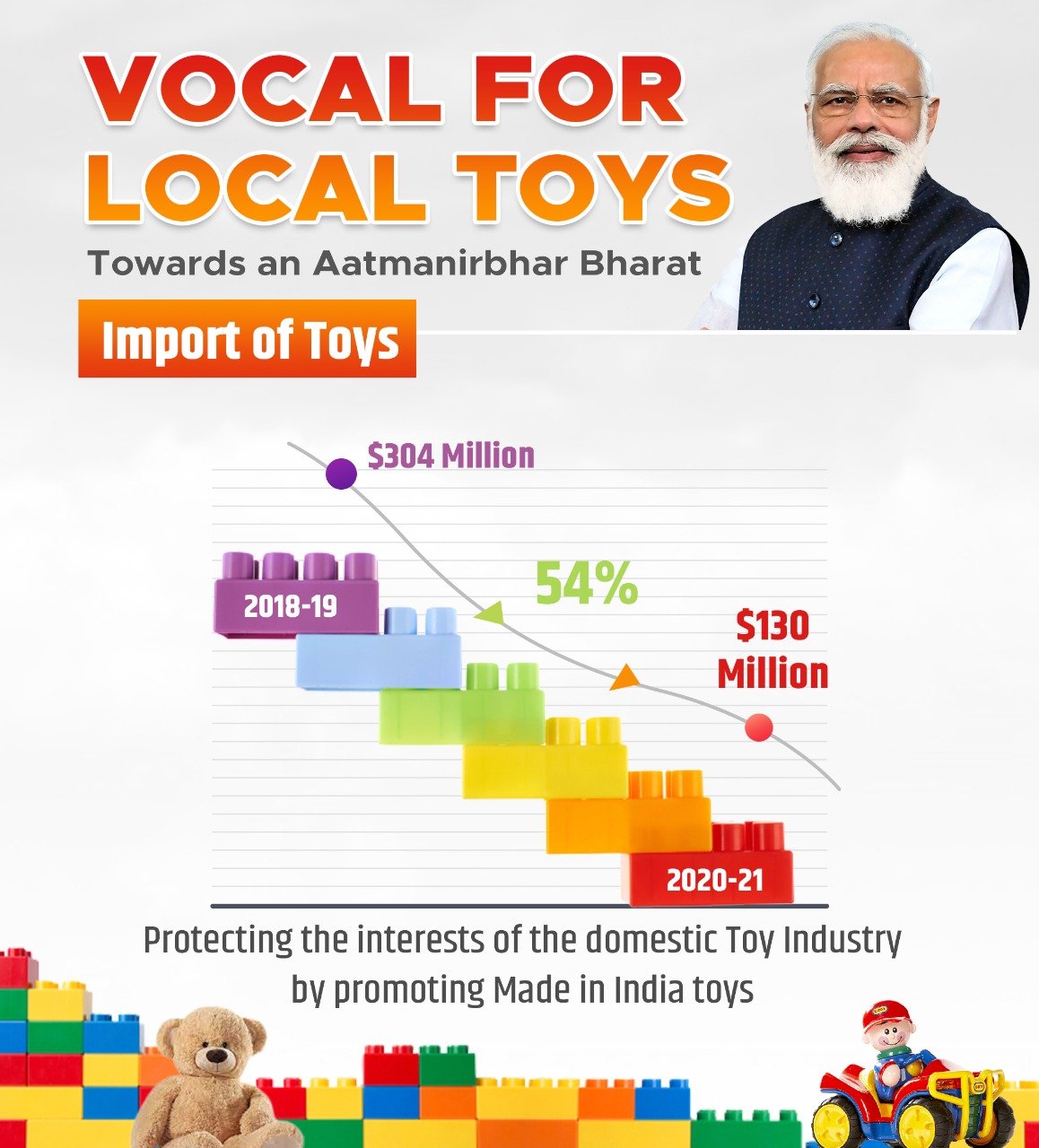
Steps Taken in Toy Industry
- Stringent quality tests for imported toys.
- Increase in customs duty on imports.
- Introduction of new licenses for domestic manufacturers.
- Directorate General of Foreign Trade (DGFT) mandated sample testing & quality approval before sale.
Toys (Quality Control) Order, 2020
- Toys (Quality Control) Order, 2020, made BIS certification mandatory from January 1, 2021.
- DPIIT issued the order to regulate toys and related products for children under 14 years.
Challenges faced by the toy industry
- High taxes on machinery hinder small manufacturers from upgrading production methods.
- Reluctance to produce electric toys due to high import duties on equipment.
- Struggle to keep up with regulatory changes and BIS standards.
- Small-scale retailers face supply shortages due to reliance on quality products from larger companies.
- Concerns over potential changes in the tax system and its impact on competitiveness.
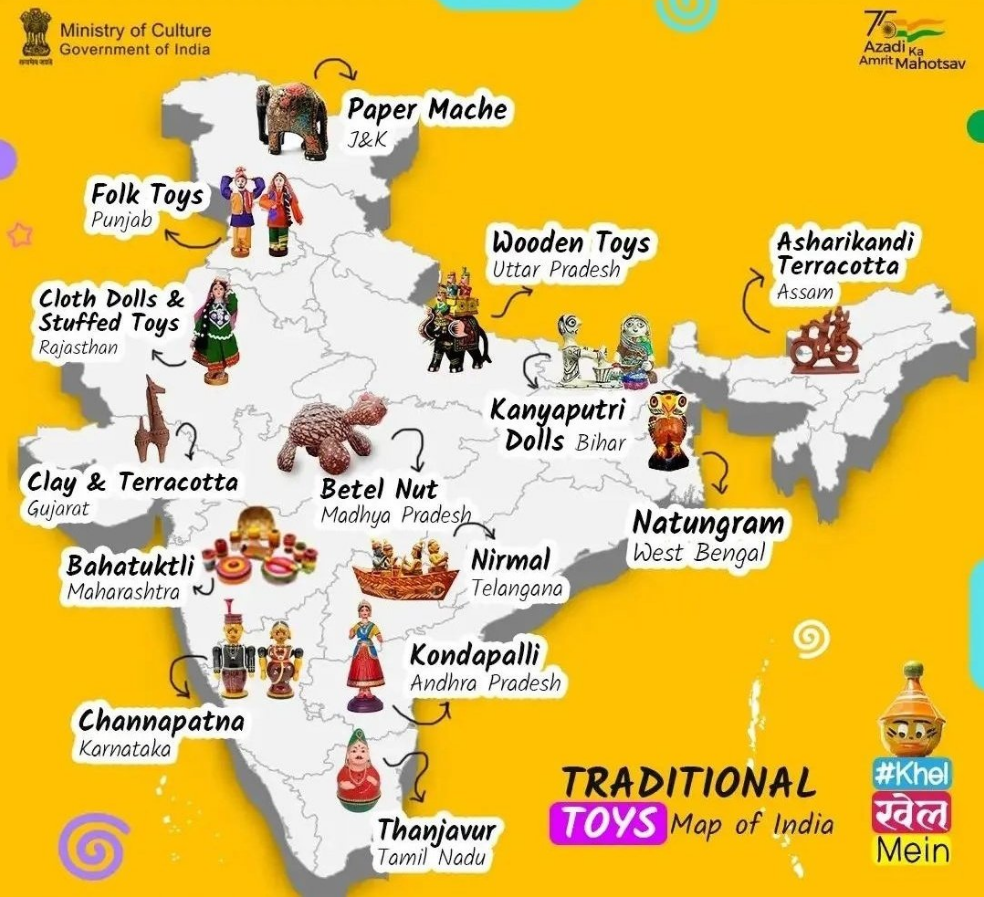
{GS3 – IS – AFSPA – 2023/07/10} Armed Forces Special Powers Act, 1958
- Context (TH): Security forces are facing significant limitations in operating in Manipur in the absence of special power provided under AFSPA in many areas, Army sources say.
- Armed Forces Special Powers Act (AFSPA), 1958, was enacted due to increasing violence in the Northeastern States, which the State governments found difficult to control.
- Jammu and Kashmir has a separate J&K Armed Forces (Special Powers) Act, 1990.
- AFSPA gives the authority to use force or open fire to maintain public order in “disturbed areas”.
- Under AFSPA, armed forces have the authority:
- To prohibit a gathering of five or more persons in an area.
- To prohibit carrying weapons, firearms or ammunition.
- To use force or even open fire after giving due warning if they feel a person is in contravention of the law.
- To arrest a person without a warrant, enter or search premises without a warrant, and ban the possession of firearms, if reasonable suspicion exists.
- To recover any confined person or any arms and ammunition stored unlawfully.
- Without the Central Government’s previous sanction, no person can be prosecuted or subjected to any legal proceedings for action taken under the Act.
- The Act applies not only to the three-armed forces but also to paramilitary forces such as the Central Reserve Police Force (CRPF) and the Border Security Force (BSF).
Disturbed Area
- A disturbed area is one which is declared by notification under Section 3 of the AFSPA.
- An area can be disturbed due to differences or disputes between members of different religious, racial, language or regional groups, castes, or communities.
- The Central Government, State Governor, or Union Territory administrator can declare the whole or part of the State or Union Territory as a disturbed area.
- Currently, the Ministry of Home Affairs has issued “disturbed area” notifications for Nagaland and Arunachal Pradesh. The respective state governments issued the notification for Manipur and Assam.
The ambit of the law
- AFSPA is effective in:
- Some parts of Nagaland, Assam and Arunachal Pradesh.
- Manipur (excluding seven assembly constituencies of Imphal).
- Parts of Arunachal Pradesh.
- Tripura withdrew from the AFSPA in 2015.
- Meghalaya was under the AFSPA for 27 years until the MHA revoked it on April 1, 2018.
Judicial intervention
- The SC in Naga People’s Movement of Human Rights v Union of India, 1997 upheld the constitutional validity of AFSPA.
- The SC said that:
- Declaration of an area as a disturbed area has to be for a limited time period.
- There must be a periodic review of the declaration every six months prior to its expiry.
Way forward
- The continued reliance on “allegedly draconian” AFSPA to impose public order must be halted.
- In 2005, a committee headed by former SC judge B.P. Jeevan Reddy recommended repealing AFSPA.
- It is time for the Centre to revisit the Jeevan Reddy committee report and find ways of humanising AFSPA or revoking it altogether.
{GS3 – S&T – IT – 2023/07/10} Open Network for Digital Commerce (ONDC)
- Context (PIB I ET): Central Cottage Industries Corporation of India has joined ONDC to broaden its market reach and facilitate convenient customer access to Handicrafts and Handloom products.
- ONDC is a government initiative to transform India’s e-commerce market by shifting from a platform-centric to an open-network model.
- ONDC aims to streamline transactions between buyers and sellers, irrespective of the platforms (intermediaries) they are affiliated with.
- Just like Unified Payments Interface (UPI) enables smooth money transfers across diverse payment platforms, ONDC enables smooth transactions between buyers and sellers across platforms.
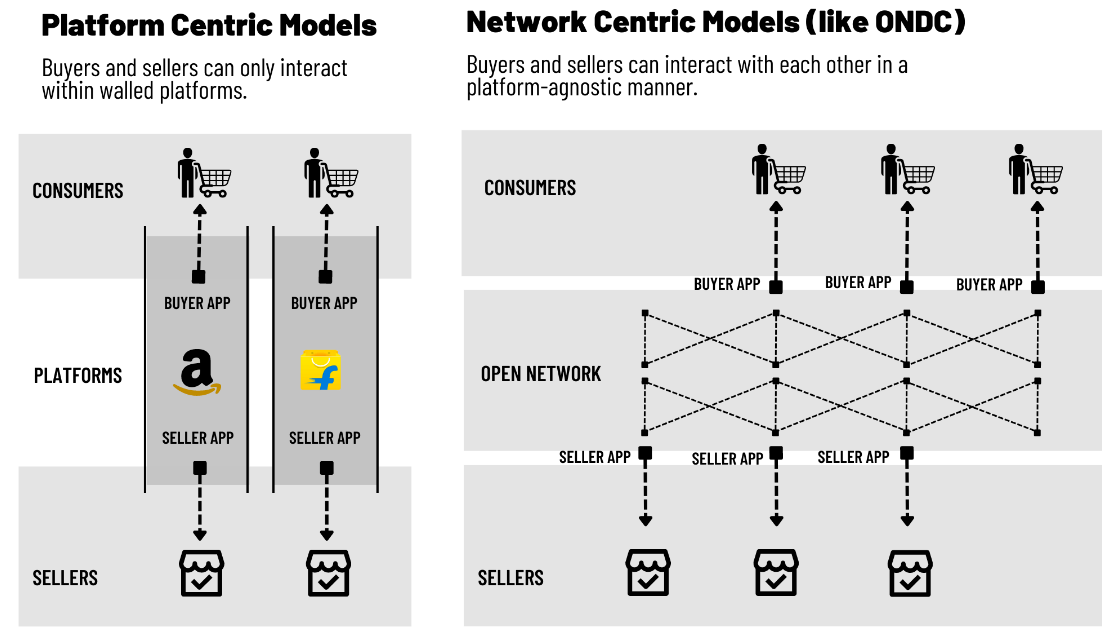
Objectives of ONDC
- Democratization and decentralization of e-Commerce;
- Inclusivity and access for sellers;
- Increased choices and independence for consumers
- Making goods and services cheaper.
Benefits and Challenges
|
Benefits of ONDC |
Challenges of ONDC |
| Provides a level playing field for e-commerce. | Implementation involves technological complexity |
| Offers wider digital market access for MSMEs and traders. | Established e-commerce companies may lose customers to ONDC. |
| Drives competition and innovation in various sectors | Sellers already have the freedom to list products on multiple platforms. |
| Increases freedom of choice for consumers. | Limited impact as information services like price-comparison websites already exist. |
| Creates a neutral and regulated platform. | Uncertainty in handling customer complaints. |
| Promotes openness & interoperability. | Reluctance from major e-commerce players to join due to control, dominance, and infrastructure challenges. |
{Prelims – Bio – Diseases – 2023/07/10} Primary Amoebic Meningoencephalitis
- Context (TH): A 15-year-old boy died due to primary amoebic meningoencephalitis (PAM).
- PAM is a rare brain (central nervous system) infection caused by Naegleria fowleri.
- It is usually fatal (causing death).
Naegleria fowleri
|
Spread of infection
- Naegleria fowleri infects people by entering the body through the nose, usually while swimming.
- PAM does not spread from drinking water contaminated with Naegleria.
- People also do not spread the amoeba or PAM to others.





![PMF IAS Environment for UPSC 2022-23 [paperback] PMF IAS [Nov 30, 2021]…](https://pmfias.b-cdn.net/wp-content/uploads/2024/04/pmfiasenvironmentforupsc2022-23paperbackpmfiasnov302021.jpg)





